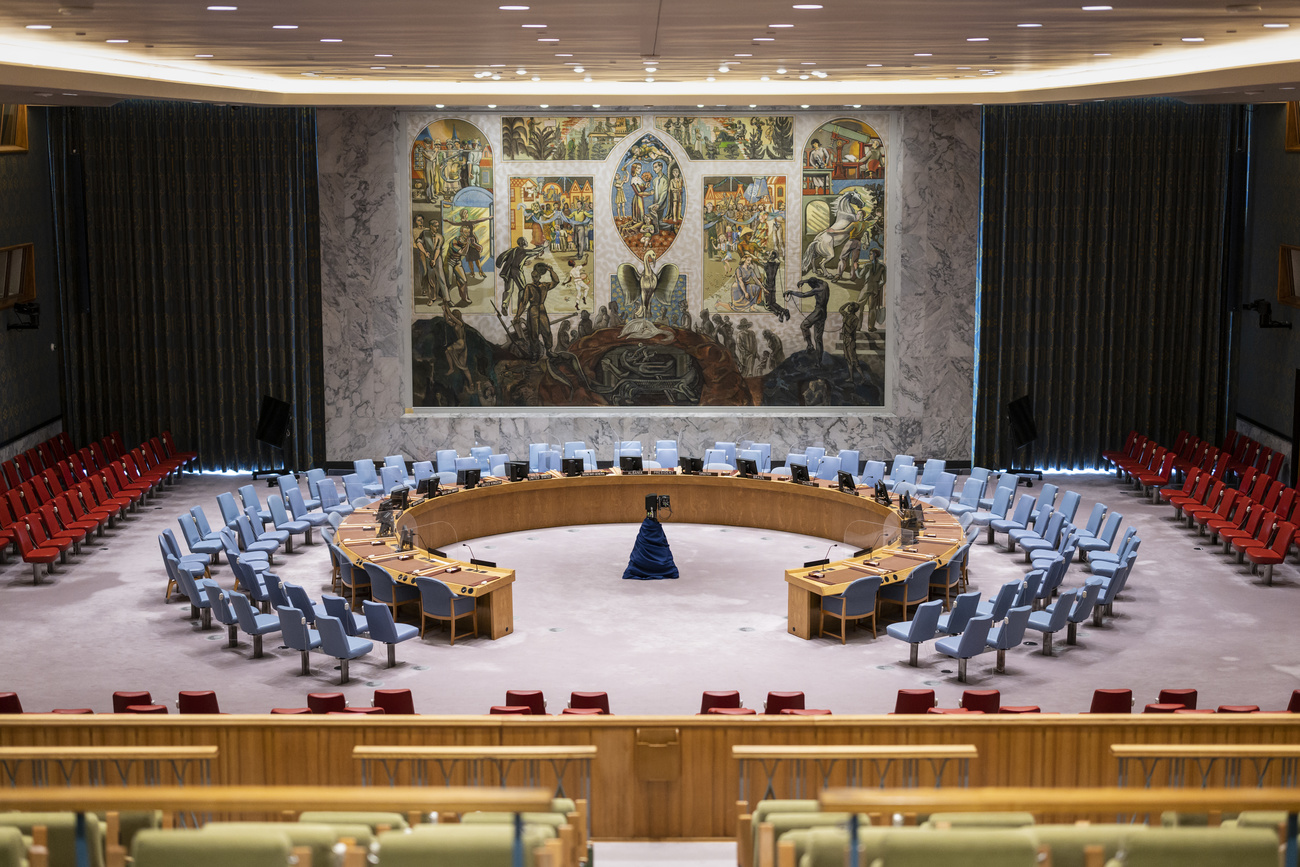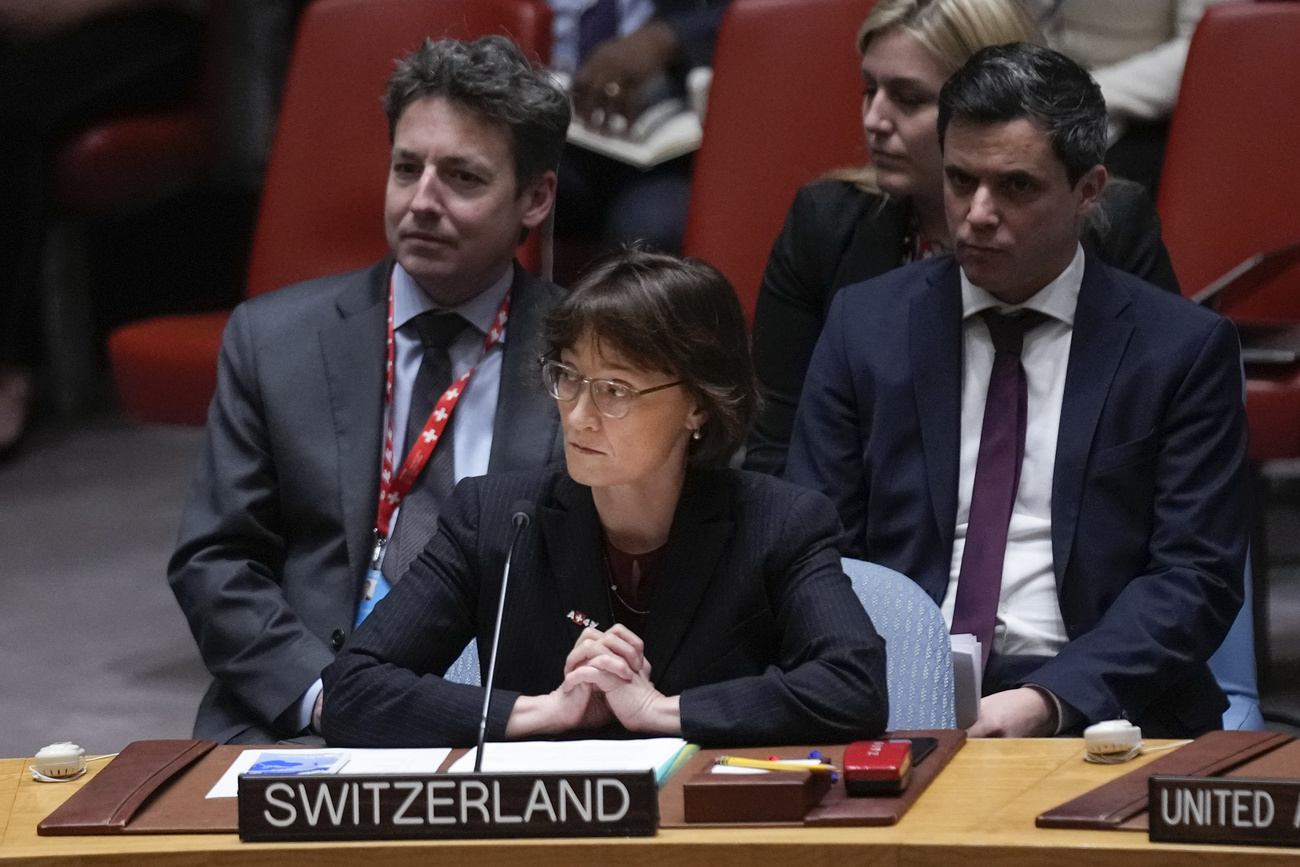Swiss scandals considered peanuts by UN standards

Pressure on the Swiss government is growing, and there are several reasons for it. Its reluctance to allow the re-export of arms to Ukraine; its sluggishness to freeze Russian assets; and last, but not least, the collapse of Credit Suisse have put Switzerland under an unflattering spotlight.
One would expect that this would damage Switzerland’s position as chair of the United Nations Security Council. But if you ask around at the UN headquarters in New York, nobody seems to be bothered about it.
Theoretically, all 193 UN member states have equal rights, however, in reality it is a different story. Thanks to their veto power, the five permanent members of the UN Security Council are in a different league than the ten non-permanent members that serve two-year terms on the top global body for maintaining international peace and security. Their ambassadors are the kings and queens of the Turtle Bay neighborhood in Midtown Manhattan, which boasts the UN complex and a high concentration of diplomatic missions.
One of the kings is the permanent representative of France to the UN, Nicolas de Rivière. “My team and I are extremely happy about our cooperation with Switzerland in the Security Council, and with Swiss Ambassador Pascale Baeriswyl. There are no dark clouds on the horizon [in our relationship],” says the 59-year-old top diplomat. Coming from Rivière, this is a big compliment as he is not someone who uses flowery phrases but speaks his mind when necessary. “France and the EU stand shoulder to shoulder with Switzerland when it comes to relevant issues, the central principles, international law and human rights.”
De Rivière is not under the impression that Switzerland’s ability to act is curbed by its neutrality. “We know neutrality and respect it,” he says. “Sometimes it’s actually useful that Switzerland can play a special role: either as bridge-builder, as platform for negotiations, or because of its humanitarian tradition and the ICRC.” But what about the criticism Switzerland faces for its reluctance to re-export arms to Ukraine or its alleged hesitation to freeze Russian oligarchs’ funds? The head of the Swiss mission to the UN in New York, Baeriswyl, thinks that such issues are only marginally discussed at the UN headquarters. This may also be due to these not being ‘classic’ UN Security Council issues.
De Rivière does not quite agree: “These issues are being discussed. Sometimes we try to convince countries –and this is by no means only Switzerland – to take action. But what’s crucial is that Switzerland has always clearly and consistently condemned Russia’s attack on Ukraine. It has also joined EU sanctions on Russia, and that’s important. By the way, individual differences do not only exist between Switzerland and the EU. There are even bigger disagreements within the EU.”
The French diplomat points out that since the beginning of the war, Germany has changed its tune and had to get into gear. De Rivière is not alone with his perception of the Swiss mission in New York. Similar comments about Switzerland are often heard in conversations. Former Swedish and current EU ambassador to the UN, Olof Skoog, for example, talks about an “excellent cooperation with Switzerland. “It has a very firm position based on principles, especially on the Ukraine issue. At least, this is how we perceive it here.”
Vanessa Frazier, the ambassador of Malta, which also holds a non-permanent seat as a member of the UN Security Council, even goes as far as to describe Switzerland as an ‘EU Plus Country’. In her view, Switzerland has no image problem and what counts is that everyone agrees on the important issues. Christian Wenaweser, Liechtenstein’s long-standing ambassador to the UN, concurs. “It may not be Switzerland’s easiest time,” he says. “But I don’t think this will have a negative impact on Switzerland in the Security Council. Matters such as arms exports and oligarchs’ assets are – if at all – informally discussed as a side issue at UN headquarters.”
“Of course, UN diplomats read the papers and find out about the criticism Switzerland receives for its decisions,” says UN director at the International Crisis Group, Richard Gowan. “But overall, Switzerland is perceived as a reliable partner of embattled Ukraine.” There is another interesting fact: while almost all European countries have supported Kyiv and imposed sanctions on Russia, it is completely different on a global scale. Most governments have not joined the sanctions, and many do not consider Russia’s war against Ukraine to be the most important global political problem.
It’s a question of perspective, which can be completely different when you talk to people at the UN or those in Switzerland or Europe. The Swiss are usually shocked, irritated and even upset when they receive criticism from abroad. However, what seems to be a hailstorm of criticism in Bern, is a storm in a teacup in New York. And this applies to arms exports, oligarch’s assets and the collapse of Credit Suisse. The latter may damage Switzerland’s reputation as a financial hub, but certainly not its prestige as a political power.
Ambassador de Rivière describes it this way: “We followed the demise of Credit Suisse, but we also followed how quickly and convincingly Switzerland came up with a solution.” It’s hard to find anyone in New York these days who doesn’t see Swiss membership of the Security Council and the UN in general as an added value.
Translated from German by Billi Bierling

In compliance with the JTI standards
More: SWI swissinfo.ch certified by the Journalism Trust Initiative











You can find an overview of ongoing debates with our journalists here . Please join us!
If you want to start a conversation about a topic raised in this article or want to report factual errors, email us at english@swissinfo.ch.